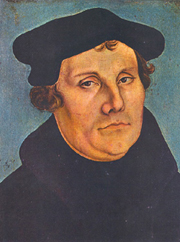Of Mortal Ills Prevailing
Week of Monday November 15, 2004
Lectionary Readings (Revised Common Lectionary, Year C)
Jeremiah 23:1–6
Luke 1:68–79
Psalm 46
Colossians 1:11–20
Luke 23:33–43
Thinking about how deeply mired our country is in the Iraqi war, a war that seems more chaotic and less winnable no matter how much time and money we spend, has caused me to think about a passage from the German philosopher G.W.F. Hegel (1770–1831). When Hegel surveyed human history he observed virtue, good intentions and legitimate aims mixed with violence, passion, and folly. This alchemy of reason and horror produced a volatile cocktail of human destruction so spectacular, wrote Hegel in his Lectures on the Philosophy of World History (1830), that it could only evoke "the deepest sympathy for the indescribable misery" and "the most profound and helpless sadness."
 |
GWF Hegel, 1770-1831 |
Philosophers are notorious for their florid prose, but Hegel insisted that his was no mere "rhetorical exaggeration." If he were alive today, I believe that he would discover that he spoke more than he knew. Right now there are about thirty-five major conflicts raging in the world, wars that have little to show for their efforts except human carnage, disrupted and displaced lives, starvation, and socio-economic chaos. Conservative estimates suggest that in the 20th-century alone at least 150 million people died in wars; others place the figure as high as 200 million. Chinese and Soviet communism have been the most prolific malefactors. Civilians, especially children, bore the brunt of this carnage.
To narrow my focus to just one example, consider the conflict that has killed more people than any war since World War II, and which is also the most under-reported current atrocity. According to the International Rescue Committee, "the conflict in the Democratic Republic of Congo [former Zaire] erupted as seven nations, three main rebel groups and numerous militias began fighting over a complex mix of economic, ethnic, state and factional interests, plunging the country into a devastating humanitarian crisis. A 2002 mortality survey conducted by the IRC found that between August 1998 and August 2002, approximately 3.3 million people died from the ongoing conflict. That makes approximately 2,000 war-related deaths every day for four years." An additional 2.7 million people have been displaced. Amnesty International recently reported that in the last six years at least 40,000 women and girls have been raped by Congo fighters. A fragile peace agreement was reached in 2003, but most everything about the nation's health care, food production, education, economy, water and sanitation has been devastated.1
Thus Hegel described human history as "the slaughter bench on which the happiness of peoples, the wisdom of states, and the virtue of individuals have been sacrificed." He insisted that "our thoughts cannot avoid the question for whom, for what final aim these monstrous sacrifices have been made.” Nor can we pass off these spectacles of horror as "the work of nature." No, said Hegel, they are "the will of men." So, the ancient text of the Bible sounds strikingly contemporary when the Psalmist for this week laments the cosmic chaos all around: the earth gives way, mountains crumble into the sea, and the ocean's waters roar and foam. "Nations are in an uproar," wrote the Psalmist, "the earth melts, kingdoms fall" (Psalm 46:2-3, 6).
 |
William Shakespeare, 1564-1616 |
Whereas Hegel surveyed the landscape of human history, it was the genius of Shakespeare to map the terrain of our inner geography. In his recent biography Will in the World (2004), Stephen Greenblatt shows how Shakespeare developed a "special technical skill" and "epochal breakthrough" in play writing when he perfected the means for an actor to portray human "inwardness." In Hamlet especially, we observe "the internal monologue...the hidden processes of interiority....inner theater...and the unprecedented representation of tormented inwardness."2
When we move from the macro, public realm of world history to the micro, private space of the human heart, we know that wars can rage just as fiercely in our inner recesses. What Greenblatt describes as our "inward insurrection" can sometimes be little more than a low level skirmish, as when you lie down to sleep at night only to experience what my wife calls "whizzy brain," the inability to shake a common care or concern. I liken it to the inability to find the psyche's off switch; the tapes keep playing on a continuous loop. Other interior insurrections are more pernicious and pronounced. Right now, for example, my eighty-two year old mother has been moved to fully assisted living after having taken a fall. She remains disoriented and admits that she is afraid; I do not admit to her that I am afraid for her too. It is clear that she now travels a one way path named infirmity and deterioration. Then there is a church acquaintance whom I have visited in the hospital since he slipped into a coma eight weeks ago. I pray for him and his family, but still feel nagged by what Hegel described as "profound and helpless sadness." At its worst, as with Hamlet, inner brooding can give way to depression, madness and thoughts of suicide ("To be, or not to be").
I have always taken heart that the Apostle Paul admitted that he was "harassed at every turn—conflicts on the outside, fears within" (2 Corinthians 7:5, NIV), or, if I may state it metaphorically and anachronistically, by the external horrors of Hegelian history and the interior torments of Shakespearean psychology.
 |
Martin Luther, 1483-1546 |
The Psalmist for this week advises us to "be still and know that I am God," for the God he worships "makes wars cease, breaks the bow, shatters the spear, and burns the shields" (Psalm 46:9–10). It was this very Psalm 46 that inspired the Protestant reformer Martin Luther (1483–1546) to write his classic hymn "A Mighty Fortress" in 1529 (translated from the German by Frederick Hedge in 1853):
A mighty Fortress is our God, a Bulwark never failing,
Our Helper He amid the flood of mortal ills prevailing.
For still our ancient foe doth seek to work us woe;
His craft and power are great; and, armed with cruel hate,
On earth is not his equal.Did we in our own strength confide, our striving would be losing;
Were not the right man on our side, the man of God's own choosing.
Dost ask who that may be? Christ Jesus, it is He;
Lord Sabaoth His name, from age to age the same,
And He must win the battle.And though this world, with devils filled, should threaten to undo us,
We will not fear, for God hath willed His truth to triumph through us.
The prince of darkness grim, we tremble not for him.
His rage we can endure, for lo! his doom is sure;
One little word shall fell him.That Word above all earthly powers, no thanks to them, abideth;
The Spirit and the gifts are ours through Him who with us sideth;
Let goods and kindred go, this mortal life also;
The body they may kill: God's truth abideth still;
His kingdom is forever.
Luther was buffeted as much by interior anxiety as by the chaotic historical forces unleashed by the Protestant Reformation he started, so much so that one biographer, Martin Marty, characterizes his entire life around the notion of Luther's "delicious despair." In delicious despair one is in such straits that you can only cast yourself upon the mercy of God. For Luther, there was no certainty or guarantee that in this life we would be spared from the human misery index; but we can experience a deep security, he thought, in remembering the words of the Psalmist for this week, that however much the earth shakes and devils threaten to undo us, a more powerful God is with us and for us right where we find ourselves.
[1] www.theirc.org.
[2] Stephen Greenblatt, Will in the World; How Shakespeare Became Shakespeare (NY: WW Norton, 2004), pp. 298–311.





